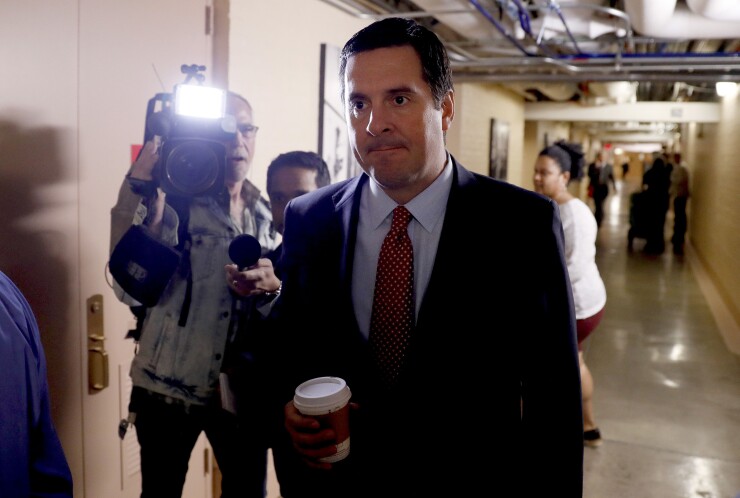
WASHINGTON – Rep. Devin Nunes, R-Calif., this week reintroduced legislation that would bar the federal government from bailing out state and local pension systems and would require state and local governments to file annual pension plan reports with the Treasury or risk losing their ability to issue tax-exempt bonds.
H.R. 4822, or The Public Employee Pension Transparency Act, would “encourage transparency” in state and local pension systems, Nunes said. If state and local governments do not file pension information, they would be stripped of their ability to issue tax-exempt bonds. Treasury would then make information regarding liabilities available through a publically accessible website.
The bill is “essentially the same” as the bills introduced by Nunes under the same name in 2011 and 2013, with “no substantive changes,” to the 2013 iteration, according to a Congressional aide.
Nunes’ bill comes a week after Senate Democrats proposed legislation that would allow Puerto Rico and its public authorities to restructure their roughly $70 billion in debt. His bill would “shut the door” on any potential federal bailouts of states, one source said.
“Many state and local pension funds are hiding vast debts through accounting gimmicks,” Nunes said in a press release. “The taxpayers have a right to know the true condition of these pension plans, and the systems’ participants need to know how secure their benefits are.
“The fact that public pension debt helped spur the Puerto Rican debt crisis should serve as a warning of the devastating effects that can result from underfunded pension systems.”
The 19-page bill, referred to the House Ways and Means Committee on Monday, is cosponsored by Reps. Larry Bucshon, R-Ind.; Jeff Duncan, R-S.C.; Kenny Marchant, R-Texas; Todd Rokita, R-Ind.; Dennis Ross, R-Fla.; and Chris Stewart, R-Utah.
The 2013 bill was criticized by some industry participants, who argued it did not further protect public employees and imposed harsher federal regulations on retirement systems. Jeannine Markoe-Raymond, director of federal relations for the National Association of State Retirement Administrators, said the federal government has no fiscal responsibilities when it comes to state and local governments.
“The concern is there doesn’t seem to be much understanding of state and local finance,” Markoe-Raymond said. “This would put a whole new layer of federal bureaucracy on state and local governments and doesn’t do anything to protect benefits. It’s just an added cost imposed by the federal government.”
On March 14, a coalition of 18 state and local government groups including the National Association of State Retirement Administrators, the National Conference of State Legislatures and the U.S Conference of Mayors penned a letter to House Speaker Paul Ryan, R-Wis., urging him not to cosponsor Nunes’ bill. The groups called the legislation a “dangerous precedent,” and cited recent state modifications to pension financing and benefits structures.
“This legislation creates a dangerous precedent with regard to federal taxation and regulation of state and local governments,” officials wrote in the letter. “Federal interference into the fiscal affairs of state and local governments is neither requested nor warranted.”
Nunes in the bill said public employee pension benefit plans are have become a “large financial burden” on state and local governments, and have caused tax increases and the reduction of services.
Nunes cited several economists, who he said have found that the extent to which public employee benefit plans are underfunded is obscured by governmental accounting rules. This, he said, misstates plan assets and plan liabilities and ultimately threatens state and local budgets.
“There currently is a lack of meaningful disclosure regarding the value of State or local government employee pension benefit plan assets and liabilities,” Nunes states in the bill. “This…poses a direct and serious threat to the financial stability of such plans and their sponsoring governments.”
In the bill, officials cite an upcoming study from Stanford Professor of Finance Joshua Rauh, who estimated the current unfunded liabilities for state and local public employee pension plans at $3.4 trillion, which would be nearly triple the $1.2 trillion figure reported by pension funds. Under the bill, annual pension reports would have to include funding status, assets, net unfunded liability, and funded percentage, as well as a schedule of contributions for the year.
The bill says that about 20 million active public workers have been promised pension benefits, while another 7 million retirees and dependents already receive them.





